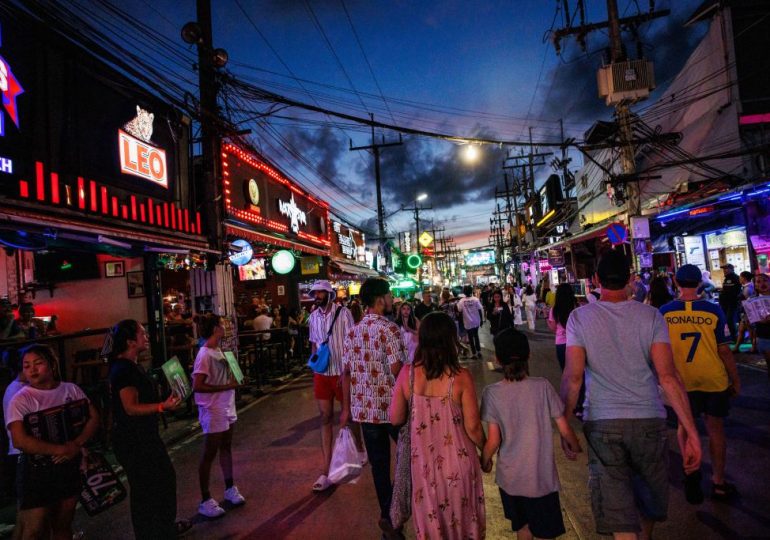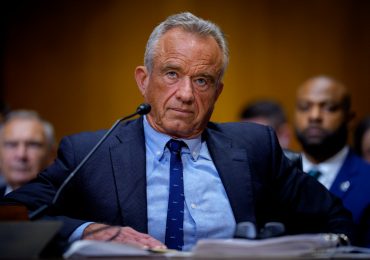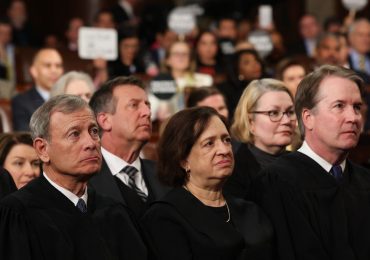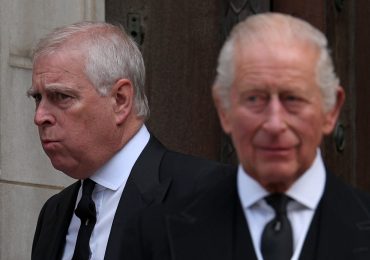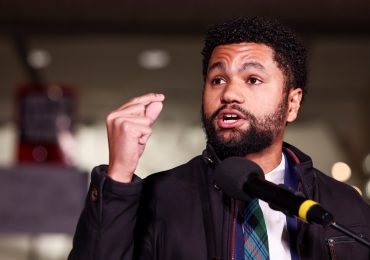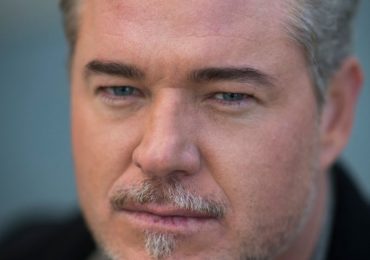It’s just past 11 p.m. on Phuket’s neon-festooned Bangla Road and revelers are out in force, though the heady atmosphere is distinctly more Sochi than Southeast Asia. TVs overhanging the sprawling beer bars show ice skating instead of soccer; Cyrillic signage proliferates; and Russian-speaking touts dispense flyers for pole-dancing clubs exclusively featuring women from former Soviet republics. “Russians, Ukrainian, Belorussian, Kazakhs,” says one tout in dark Ray Bans and a skin-tight Armani polo shirt. “We have them all here.”
[time-brightcove not-tgx=”true”]
The war in Ukraine has entailed an incalculable human toll, while roiling markets, disrupting supply chains, and sending inflation soaring across the globe. But in Thailand, the two-year-old conflict is also having a profound social effect despite being over 4,000 miles away. While many Western nations have shut out Russian air travel in response to Vladimir Putin’s full-scale invasion of Ukraine, Thailand sees Russian arrivals as key to reviving its pandemic-ravaged tourism industry. In October, Thai Prime Minister Srettha Thavisin extended 90-day visas upon arrival for Russian passports, insisting in a February interview: “We’re not part of the [Ukraine] conflict. We are neutral.”
Read More: 5 Takeaways from TIME’s Conversation with Thai Prime Minister Srettha Thavisin
Last year, Russians ranked top for tourist arrivals in Thailand from outside of Asia with 1.4 million visitors. Meanwhile, Russians were top overall on the southern resort island of Phuket, which has long been a favorite haunt. Last July, Russian Foreign Minister Sergey Lavrov visited Phuket to inaugurate a new consulate to cope with surging visitor numbers. A month later, the Phuket Tourist Association sent a delegation to St. Petersburg and Moscow seeking to court even more vacationers.
In the first three months of this year, 366,095 Russians arrived at Phuket International Airport, almost double the same period of 2023 and transforming the island’s commercial and social life. (That figure doesn’t include the significant number who transferred via Thailand’s main gateway of Suvarnabhumi International Airport in Bangkok.) But while a boon for the macro economy, the influx has chafed with locals who increasingly complain that Russians are stealing jobs and upsetting cultural mores. Across Thailand, lurid headlines such as “Rabid Russian assaults police team in Phuket after going berserk at a city centre hotel” and “Russian tourist kicks pregnant Thai woman after asked to leave shoes outdoor” are both a symptom and cause of alarm. (However, transgressions involving New Zealand, Swiss, and Portuguese nationals admittedly proliferate also.)
“Russia and Thailand are so different and sometimes they don’t understand Thai law and culture,” Lieut. Colonel Akachai Siri, chief inspector of Phuket Tourist Police, tells TIME. “Sometimes they break the law and they don’t recognize we have law enforcement.”
Nevertheless, Thailand’s Russian incursion appears here to stay. Other than the preferential visas, sanctions on Russian air carriers and reciprocal bans on Western airlines have slashed the destinations where Russian nationals can escape their frigid winter, making already-popular Thailand an easier choice. And then there are the not inconsiderable numbers fleeing economic doldrums and a war of choice that they had no part in choosing—not least since the Kremlin has ramped up military conscription amid mounting casualties.
“That was the final straw for us,” says Mark, a Russian who fled to Thailand with his boyfriend after an initial draft announcement in September 2022 and asked that TIME use a pseudonym for security. “We understood we can’t go back because anyone can be called to the army and just die in the war.”
As a result, the number of Russians choosing to stay in Thailand long-term is soaring. Beyond 90-day visas upon arrival, thousands are applying for one-year business or education visas. Arnold, who asked that TIME use only one name for fear of reprisals in his homeland, moved from Moscow to the Thai resort town of Hua Hin permanently last year and has noticed an increase in what are colloquially termed “relocants” fleeing the “various negative things which are going on back home.”
The affluent are acquiring luxury cars and yachts and renting or purchasing villas. Phuket’s plush Laguna beachfront complex of villas, ornamental lake, and 18-hole golf course is now dubbed “Little Moscow,” says Bhummikitti Ruktaengam, advisory chairman to Phuket’s Tourist Association. Over half of all residents across its 1,000 acres are Russian, according to the Laguna real estate management office, which employs two native Russian speakers to deal with the shifting demographic. Across Phuket, real estate prices have bumped some 20% owing to the Russian influx, says Bhummikitti.
The incursion has also increased pressure on Akachai’s Tourist Police, which has only 60 officers to assist the 2,000-odd regular Royal Thai Police and 60 dedicated Immigration Police across both Phuket and the larger adjacent province of Pha Nga. In addition to swelling tourist numbers, whereas 60% of tourists before the pandemic traveled on tour groups with guides and agents on hand to smooth any problems, today, 70% are independent travelers, which means the Tourist Police are increasingly called to mediate all manner of conflicts.
Relaxed entry requirements have also attracted a criminal element. In early February, Phuket police arrested five suspected Russian gangsters for the kidnapping and extortion of over $800,000 in cryptocurrency from a Belarussian couple that Akachai says was retaliation for a financial dispute back home. And last month, a 42-year-old Russian man was found stabbed to death in a rented house that was being used as a cannabis farm. The chief suspect is a Tajikistani man who fled Thailand for Turkey just hours after the murder.
Yet Akachai says most crimes relate to illegal work involving Russians determined not to return home while the war rages but without the means to support themselves indefinitely—not least since international banking sanctions have rendered accessing savings more difficult. Many Russians have set themselves up as unofficial tour guides, car and motorbike rental services, real estate agents, hairdressers, or even sex workers, advertising online via Telegram groups.
Yet not all aspects of the phenomenon are troublesome. Other than Russians, a significant number of Ukrainians have fled their war torn nation for Thailand, potentially creating a tinderbox atmosphere. But Akachai says he has not encountered a single skirmish or negative incident between the two nationalities in Phuket. Yury Rozhkov, 46, a Russian national who works for a travel agency in Bangkok, says he regularly meets Ukrainians staying in his apartment building and relations are nothing but cordial.
“They understand it’s Putin, it’s not Russia, Russian people are different,” he says. “And I’m sure Russians who have money to travel to Thailand do not support Putin and the war in Ukraine.”
In Hua Hin, Arnold is a member of a Russian-language Telegram group with more than 4,500 members from across the former Soviet bloc, but he says he cannot recall a single politically charged message among the 400 or so posted every day. “99.9% of discussions are where to find the best pad thai, current prices in the local market, how to rent a car, or where to get a vaccine,” he says.
Perched by the main gate of Phuket’s Laguna resort, the d’Odessa restaurant serves Ukrainian syrniki pancakes and smoked salmon croissants slathered with gold leaf. The tablet menu has options for Ukrainian, English, and Russian—and staff say the majority of clientele speak the latter. “There are many Ukrainian restaurants filled with Russians in Phuket,” says Bhummikitti.
Ultimately, both sides caught up in this senseless conflict share a desire to stay out of harm’s way by whatever means necessary. Mark is still employed by his Russian IT company thanks to an understanding boss despite remote working being strictly against company policy. Every day he fears a draft ticket or internal enquiries by higher management could spell the end to that vital paycheck. If that happens, “I will try to find a local job or another [remote] job in Russia,” he says. “I will try every way I can not to go back.”
Leave a comment
